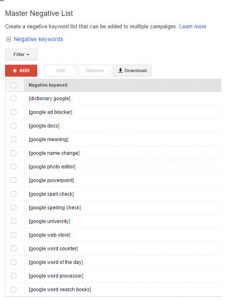Use the Right Keywords for More Traffic and Leads
 It seems like an easy question: “What are your keywords?”
It seems like an easy question: “What are your keywords?”
Yet, surprisingly, rarely does a new client or contact know the answer.
Ask yourself this:
Is your content being found in search?
If your answer is “No” – and, your traffic is less than you desire, this could be a result of using keyword phrases which are too broad or are being widely used by your competitors. In order to sell your products or services your business needs to appeal to an audience first with helpful information that they are looking for.
The best way to find out how to hone in on the best topics for your niche is to perform keyword research in places in addition to Google AdWords, which provides good results, but not narrow ones. There are a few areas in which to accomplish this:
- Online education sites such as Udemy, edX, ed2go, and iTunes
- Q&A sites like Quora, Yahoo Answers, Wiki Answers, and Ask.com
- Competitor research
- Traditional keyword research
- Social media research with chats and hashtags
Let’s break down a few examples and find out how each method can work for your content marketing strategy.
Go Where the Learners Are
One of your most valuable resources to provide free research data on your audience is through online education course websites. These have become widely popular, and provide information on what is trending, the course titles that appeal to readers, and narrowed results for keyword phrases. For example, a search in Udemy under Business: Entrepreneurship brought these results:

After selecting the course, “Branding in 60 Minutes,” tailored for beginners, the following phrases came up in the description:

Notice in the curriculum targeted course descriptions, which can help you create ideas for your articles:

Find Out What Your Readers Are Asking
Another great way to research the right keyword phrases for your target market is to visit forums and Q&A websites. In the marketing world, Warrior Forum is a popular place for readers to find the information and resources that they need. A specific and top topic like Email Marketing produces the latest questions:

A Q&A website like Quora can provide results from the most popular topics on a particular keyword. I entered ‘business,’ which produced several subtopics to choose from:

Once you select a particular topic you can choose the questions on the left to see the top results and headlines:

Research the Competition
Use tools such as paper.li, Klout, and Topsy to see the latest blog posts from the top website performers in your industry. Take a look at the some of the subjects they are writing about, then see which keyword phrases are included. Although this may be more time consuming than the other methods, it can provide a general idea of what to pay attention to, and not necessarily use in your own articles. The point of this type of research is to recognize a pattern of words being used paying attention to the response rate on each topic.
Old School Method of Keyword Research
Despite all of the recent algorithm changes in search, there are still some tools that work well for finding the right search terms for your target market. Google AdWords Keyword Planner provides results for topics and also keywords used on popular websites in your niche, which can be found by entering a high ranking website or topic. In this example I searched for Business Insider and chose the Keyword Ideas tab for narrow results:

Tap into Social Conversations
Social media is a great place to track the latest trends in your niche, and what people are saying about your brand other others. Twitter chats, for instance, can provide valuable insights into your audience’s needs and desires. Twubs is a free resource that you can use to search and find these chats. Here’s a recent list of results for the topic #entrepreneurism:

Hashtag research will also provide keywords results within social conversations, along with trending topics. Facebook profiles have a new sections of what is popular:

Instragram now offers better search results for hashtags and posts:

Use this platform for results unique to Instagram with keyword ideas that can be used for images or videos included with your content.
Twitter Advanced Search and trends can both provide additional insights into conversations going on in your market. You can change trends any time based on a specific search or allow Twitter to show you results based on your locations and follows:

Don’t forget to inquire within Pinterest and Google Plus hashtag search results as well. Gathering a variety of keywords insights from each network will help you to focus on what are the most important topics your audience is searching for.
When your business goes beyond basic keyword research and looks into these other free resources you are able to narrow down your results and focus on the phrases that have the least competition for your niche. Keep a spreadsheet going as you add your information, and return to this process at least once a month in order to find the latest and most current information in your target market.
(140)






